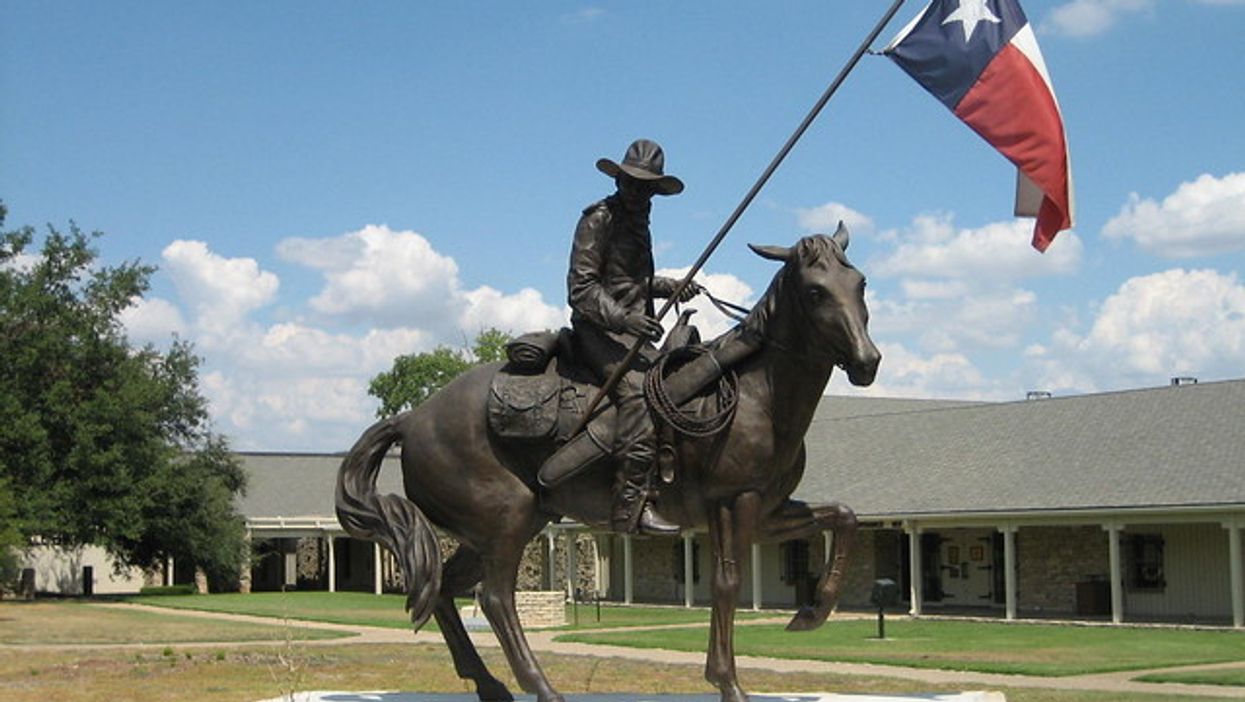Why Would Any Team Want To Be Named 'Texas Rangers’?
The injustices of the present are forcing a confrontation with our past — a past wreathed in nostalgia and myths that conceal grim realities. The Civil War ended 155 years ago, but only recently have Americans begun renouncing flags, statues and monuments paying homage to Southern traitors. Other symbols of racist oppression are also under attack.
Lately, the movement has gained momentum. A committee in the Republican-controlled Senate voted to strip the names of Confederate generals from Army bases. Protesters in Richmond pulled down statues of Jefferson Davis and Christopher Columbus. The city of Albuquerque, New Mexico, has removed a statue of a Spanish conquistador.
In Texas, the shift has put one of the world's most storied law enforcement agencies under harsh scrutiny. City and airport officials recently removed a statue that had stood at Love Field since 1962 — of a Texas Ranger.
The Rangers have always been widely revered in my native state. We learned they were fearless guardians of civilization whose exploits went back to when settlers were fighting Comanche warriors.
They were immortalized in Larry McMurtry's novel, Lonesome Dove. There was a TV series that starred Chuck Norris. The Major League Baseball team in Arlington is called the Texas Rangers.
The legends omit a lot of the reality. A magisterial new book by journalist Doug J. Swanson, Cult of Glory: The Bold and Brutal History of the Texas Rangers, lays bare their long record of savagery, lawlessness and racism.
"They burned peasant villages and slaughtered innocents," he writes. "They committed war crimes. Their murders of Mexicans and Mexican Americans made them as feared on the border as the Ku Klux Klan in the South."
A century ago, during the fighting that took place along the border during the Mexican Revolution, blood flowed like the Rio Grande. "The terms 'death squads' and 'ethnic cleansing' would not enter common usage for another sixty years or so," Swanson notes, "but that was what the Rangers were and what they did."
Later, they were a bulwark acting to hold back racial equality. When black students tried to enroll in the segregated Texarkana Junior College in 1956, angry whites barred the way, hurling gravel and racial slurs and forcing the students to leave. The Rangers stood idly by.
The message to racists, said a member of the Texas Civil Rights Advisory Committee, was plain: "If you will only assemble a mob, or threaten to do so, the power of the Texas Rangers will be on your side to deny civil rights to school children."
When farm workers, most of them Mexican-American, went on strike in 1966, some were beaten and arrested by Rangers. An old saying is: "Every Texas Ranger has Mexican blood. It's on his boots."
The revelations in Swanson's book were the impetus to take down the Love Field statue. That decision is a good start in coming to grips with the Rangers' poisonous past.
But the baseball club still carries the name of an agency that struck terror in many nonwhites.
This is not, it turns out, a new issue. Domingo Garcia, a former Dallas city council member who is national president of the League of United Latin American Citizens, recalls that when the Washington Senators baseball franchise moved to Arlington after the 1971 season, the organization held demonstrations to protest naming the team after the Rangers. "We've been the victims of Texas Ranger violence since the 1800s," he told me.
Benjamin Johnson, a Texan and history professor at Loyola University Chicago, acknowledges that the Rangers no longer murder people or block integration. "But for most of their nearly 200 years of existence, they have been an instrument of white supremacy in Texas," he says.
In light of all this, the name, like the Confederate names on Army bases, deserves to be relegated to the garbage dump of history. It's an undeserved tribute that reflects a widespread ignorance, at best, of the Rangers' malignant past.
It may be argued that the team name honors the current agency, not the worst elements of its history. But without the history and the legends, the franchise would not have adopted the name. No one would name a major league team "The Police" or "The Highway Patrol."
The Rangers name is an affront to Hispanics, African Americans, and anyone who favors racial equity. It should be an intolerable embarrassment to the owners and fans.
Even the Aunt Jemima brand had to go. And Aunt Jemima never murdered anyone.
Steve Chapman blogs at http://www.chicagotribune.com/news/opinion/chapman. Follow him on Twitter @SteveChapman13 or at https://www.facebook.com/stevechapman13. To find out more about Steve Chapman and read features by other Creators Syndicate writers and cartoonists, visit the Creators Syndicate website at www.creators.com.




